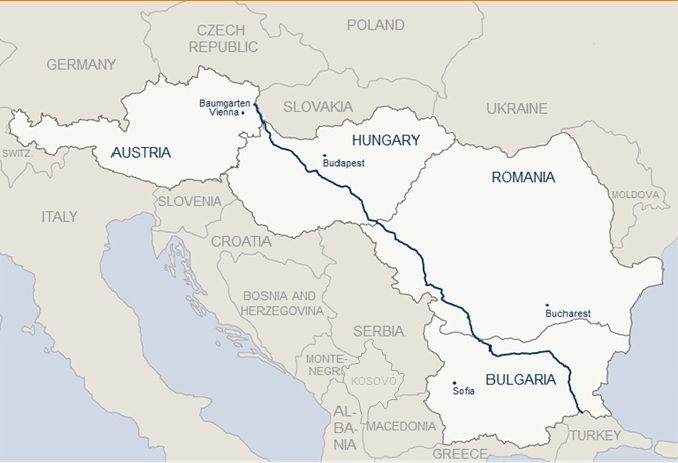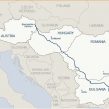
Nabucco-West Project, European Commission Face Same Moment of Truth in Baku
Publication: Eurasia Daily Monitor Volume: 10 Issue: 102
By:

On May 29, in Baku, addressing the final session of the Azerbaijani-American Forum’s “Vision for the future,” former United States Senator Richard Lugar underscored that the Nabucco-West gas pipeline project could considerably ameliorate the energy security of vulnerable countries in Central and Southeastern Europe, including US allies there (Trend, May 29). Those countries depend heavily on imported Russian gas. Lugar is one of the leading US authorities on strategically-oriented energy policy, specifically with regard to Europe.
Meanwhile, the European Commission looks on as strategic criteria are yielding to commercial and corporate ones in selecting the first pipeline route for Azerbaijani gas to Europe: either Nabucco-West from the Turkey-Bulgaria border to Vienna, or the Trans-Adriatic Pipeline (TAP) from the Turkey-Greece border to Italy.
The Shah Deniz gas producers’ consortium in Azerbaijan is expected to announce its selection decision before the end of June. Both rival projects, Nabucco-West and TAP, owe their existence to the Azerbaijani-led Trans-Anatolia Pipeline Project (TANAP), planned to run from the Georgia-Turkey border to the Turkey–European Union borders with Bulgaria or Greece. At stake in this initial stage are 10 billion cubic meters (bcm) per year of Shah Deniz gas to be delivered to Europe from 2019 onward.
The Nabucco-West project consortium needs to recover some of the ground lost by the Austrian-led management in this race to the wire. The Nabucco Committee, the coordinating body of the participant governments and companies, met on May 21 in Bucharest at the level of senior officials and national gas transportation company managements (Austrian OMV, Hungarian MOL’s unbundled subsidiary FGSz, Romanian Transgaz, Bulgargaz, and Turkey’s Botas), with Azerbaijani representatives also attending (Nabucco Newsletter, May 2013).
The Nabucco shareholders approved a draft Subscription and Shareholders Agreement at the Bucharest meeting. Under the document, certain Shah Deniz gas producers would acquire ownership stakes in the Nabucco-West pipeline project. This offer is a follow-up to the January 2013 agreement of intent between the Nabucco consortium and four of the Shah Deniz producers: Azerbaijan’s State Oil Company, BP (formerly known as British Petroleum), Norway’s Statoil, and Total of France. These companies would receive equity options totaling 50 percent to participate as investors in Nabucco-West, should the producers’ consortium select this export route. Nabucco’s rival, TAP, had been faster to conclude a more clear-cut agreement with those same Shah Deniz producers last year.
The Bucharest meeting discussed options to connect the planned Nabucco-West and TANAP pipelines at the Turkey-Bulgaria border (legally the EU border) as an integral part of both projects; apparently implying joint or shared control of the interconnection. The Nabucco and TANAP consortiums are to discuss these options. The Nabucco consortium encourages Bulgaria and Turkey to plan a TANAP-Nabucco-West interconnection. Turkey’s Botas is a shareholder in both consortiums. The Nabucco-West project company had signed a memorandum of understanding for technical and strategic cooperation with TANAP in March 2013, aiming to develop the complementarity of these two pipeline projects.
Under President Traian Basescu, Romania has championed the Nabucco project. It is the only Nabucco participant country that never seriously considered joining Gazprom’s South Stream project. South Stream would have killed Nabucco by preempting its access to markets. TAP might nip Nabucco-West in the bud by preempting its access to the resource base.
Hosting the Bucharest meeting, Romanian Prime Minister Victor Ponta noted that “Nabucco-West is the single most important step that the EU as a whole can take toward a visionary partnership with Caspian states and enhancing European energy security.” The meeting participants asked the European Commission to continue to provide technical and regulatory assistance to this project.
In the meeting’s wake, Nabucco’s Austrian-led management announced that Gaz de France Suez has agreed to join the Nabucco consortium as a shareholder. This is a mark of confidence in the Nabucco project. Gaz de France replaces RWE, Germany’s second-largest energy conglomerate, in this project. Hard hit by Germany’s phaseout of nuclear power plants, RWE had to sell its 16.67-percent stake in Nabucco to OMV in March 2013. OMV has now resold a part of that stake, amounting to 9 percent of the total shares in Nabucco, to Gaz de France. Operating the largest gas pipeline network in EU territory, and ranked at the top of Europe’s gas-buying companies, Gaz de France holds gas supply contracts in several Nabucco countries (Press Release, May 28).
The European Commission has shifted from its outspoken support for Nabucco toward political equidistance, dubbed “project-neutrality,” between the strategic Nabucco-West and the commercial-corporate TAP (see EDM, April 26). Nevertheless, European Energy Commissioner Guenther Oettinger re-emphasized the Nabucco project’s strategic rationale—that of connecting the Caspian basin with continental Europe—in a message to the Bucharest meeting: “We cannot forget the reason why the route from Turkey to Austria is so important, because it connects the largest number of vulnerable gas markets in Central and Southeastern Europe, dependent on a single supply source [i.e., Russia]. Our concern is to reduce the dependence of the most exposed countries, as soon as possible” (Press Release, May 21).
Given this concern and this priority, however, the Commission’s official stance of “project-neutrality” looks self-contradictory, in effect working to the advantage of the non-strategic TAP project, which would mainly supply Italy’s saturated and already diversified market (see accompanying article).




